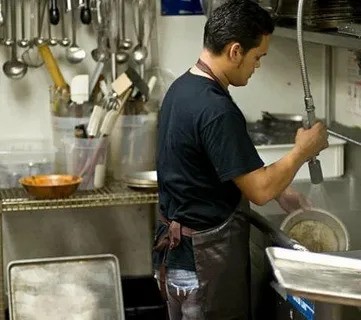Greece Dishwasher Jobs
Thinking about working abroad in Greece? Dishwasher jobs might not sound glamorous, but they’re one of the easiest ways to enter the country’s hospitality industry, especially for newcomers, seasonal workers, or those without advanced qualifications. These roles offer stable income, visa sponsorship opportunities, and the chance to experience Greece’s stunning coastal cities and rich culture — all while building your work experience.
If you’re looking for a straightforward job that pays fairly, often includes meals and accommodation, and can lead to other roles in hospitality, dishwasher jobs in Greece could be your entry point.
Why Dishwasher Jobs in Greece Are in Demand
Greece is a global tourism hotspot, with millions of visitors each year. This massive tourist flow fuels a constant need for staff in restaurants, hotels, and resorts.
Here’s why dishwashing jobs remain in high demand:
-
Seasonal tourism boom: Many restaurants double or triple staff during summer.
-
High turnover rate: Positions open regularly as staff move on to other roles.
-
No advanced skills needed: Basic English and a willingness to work hard are often enough.
-
Pathway to other jobs: Many kitchen assistants later become cooks or waitstaff.
Salary for Dishwasher Jobs in Greece
Wages for dishwashers in Greece vary depending on the location, employer, and whether accommodation is provided.
Average Salary Range:
-
€700 to €1,000/month (basic wage)
-
€1,000–€1,300/month during peak tourist season in popular areas (Santorini, Mykonos, Athens)
Benefits may include:
-
Free or subsidized accommodation
-
Free meals during shifts
-
Overtime pay for extra hours
-
Seasonal bonuses
Basic Requirements to Work as a Dishwasher in Greece
While the job doesn’t require a degree, there are still certain requirements:
-
Legal Right to Work in Greece
-
EU citizens can work without a visa.
-
Non-EU citizens need a work permit or seasonal work visa.
-
-
Basic English or Greek Language Skills
-
Many kitchen teams use English, but knowing basic Greek is a plus.
-
-
Physical Stamina
-
The role involves standing for long hours and handling heavy trays or pots.
-
-
Work Experience (Optional)
-
While not mandatory, prior hospitality or cleaning experience helps.
-
Visa Options for Non-EU Workers
If you’re outside the EU, you’ll typically need one of these:
-
Seasonal Work Visa (Type D) – Common for hospitality jobs; valid for up to 6 months.
-
Work Permit – Sponsored by the employer for long-term contracts.
Tip: Many employers in tourist destinations actively hire foreigners and help with visa processes — especially before summer.
How to Find Dishwasher Jobs in Greece
You can secure a position before arrival or search locally.
1. Online Job Portals
-
Indeed Greece (indeed.com.gr)
-
JobinGreece.com
-
Workable.com
2. Recruitment Agencies
Some agencies specialize in hospitality jobs for foreign workers.
3. Direct Applications
Hotels and restaurants in tourist-heavy areas often post vacancies on their websites or social media pages.
Real-Life Story – From Dishwasher to Chef in Greece
Naveed, a 28-year-old from Pakistan, landed his first Greek job as a dishwasher in a seaside restaurant in Rhodes. Within six months, his reliability and hard work earned him a promotion to kitchen assistant. Two years later, he became a sous chef. His advice: “Start small, work hard, and learn from the chefs — you never know where it’ll lead.”
Working Conditions
Dishwashers in Greece typically:
-
Work 6 days a week, 8–10 hours per day.
-
Operate in fast-paced kitchens.
-
Handle dishwashing machines, drying, and kitchen cleanliness.
Advantages of Dishwasher Jobs in Greece
-
Easy entry job – No advanced qualifications needed.
-
Accommodation included – Saves money.
-
Career growth – Opportunities to move into cooking or service.
-
Cultural experience – Live and work in beautiful locations.
Challenges You Should Know
-
Physically demanding – Hot kitchens, long hours.
-
Seasonal nature – Jobs may last only during tourist season.
-
Lower wages in small towns – Best pay is in tourist hotspots.
How to Increase Your Chances of Getting Hired
-
Apply early (Jan–Mar) before tourist season begins.
-
Highlight reliability and willingness to work flexible shifts.
-
Mention any hospitality experience in your CV.
-
Include language skills — even basic Greek can set you apart.
FAQs – Dishwasher Jobs in Greece
Q: Do dishwasher jobs in Greece require Greek language skills?
A: Not always. Many kitchens operate in English, especially in tourist areas, but basic Greek is helpful.
Q: Can non-EU citizens get dishwasher jobs in Greece?
A: Yes, through seasonal work visas or employer sponsorship.
Q: Are meals and accommodation usually provided?
A: Many employers offer both, especially in island resorts.
Q: What’s the average working schedule?
A: Typically 6 days a week, 8–10 hours per day.
Q: Can I move to a better position later?
A: Yes, hardworking staff often get promoted within the hospitality industry.
Your First Step into Greece’s Hospitality World
Dishwasher jobs in Greece aren’t just about cleaning plates — they’re an entry ticket into the vibrant hospitality sector of one of the world’s most beautiful countries. Whether you’re aiming for short-term seasonal work or a stepping stone to a bigger career, this role offers stability, cultural immersion, and the chance to live where others vacation.
If you’re ready to work hard, adapt, and take opportunities when they come, Greece’s kitchens could open doors far beyond the dishwashing sink.



